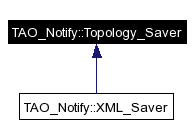
#include <Topology_Saver.h>
Inheritance diagram for TAO_Notify::Topology_Saver:

Public Member Functions | |
| virtual | ~Topology_Saver () |
| The destructor. | |
| virtual bool | begin_object (CORBA::Long id, const ACE_CString &type, const NVPList &attrs, bool changed ACE_ENV_ARG_DECL)=0 |
| Begin the storage of an object. | |
| virtual void | delete_child (CORBA::Long id, const ACE_CString &type ACE_ENV_ARG_DECL_NOT_USED) |
| Report deleted children to the saver. | |
| virtual void | end_object (CORBA::Long id, const ACE_CString &type ACE_ENV_ARG_DECL)=0 |
| End the storage of an object. | |
| virtual void | close (ACE_ENV_SINGLE_ARG_DECL) |
| Close the saver. | |
A persistent topology store must provide an implemention this interface.
|
|
The destructor.
|
|
||||||||||||||||||||
|
Begin the storage of an object. Call this function with the type and ID of an object to be stored. This object may have children, and this will necessitate nested calls to begin_object. Design principle: Names should be descriptive enough to allow the objects' parent to create an instance of the desired class. This instance will be registered with the poa using the id. The instance itself should will load its own attributes. Example <proxy type="push_supplier" events="any" id="20"...> is not a good design because the name "proxy" is not descriptive enough. "<structured_proxy_push_supplier id="20"...> is better because this allows the parent to create the correct type of object without decoding attributes.
Implemented in TAO_Notify::XML_Saver. |
|
|
Close the saver. This is not pure virtual. The default implementation does nothing. There should be a corresponding open, but the signature may vary based on the type of saver, so we can't include it in the interface. Reimplemented in TAO_Notify::XML_Saver. |
|
||||||||||||
|
Report deleted children to the saver. Use the ID and "type" as passed in to determine which child we should delete. A parent should call this function when one of its children is deleted.
|
|
||||||||||||
|
End the storage of an object. This function should be called to end the scope of the current object and commit it to the persistent store. Implemented in TAO_Notify::XML_Saver. |
 1.3.9.1
1.3.9.1